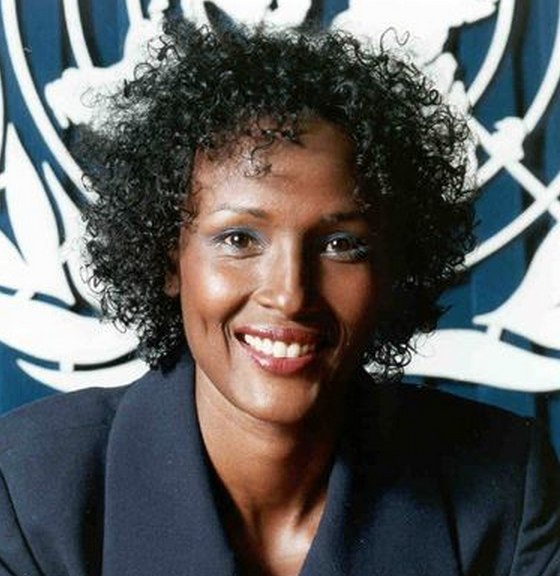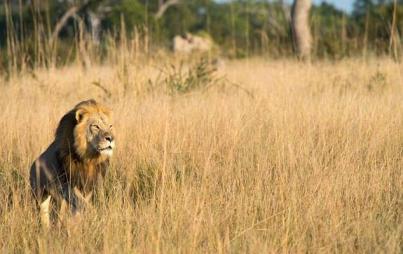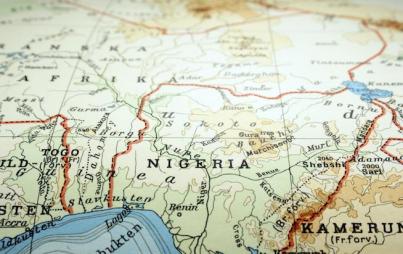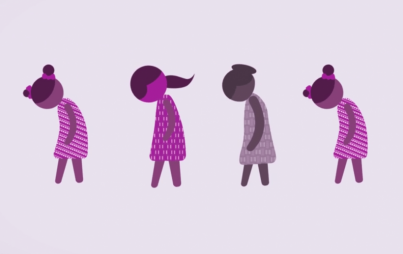
While it could be argued that every life is extraordinary, and singularly special, you’d be hard-pressed to find a journey like Waris Dirie’s. Born to a nomadic family in the desert on the edge of Ethiopia in 1965, Waris underwent female genital mutilation—a procedure that is practiced under the auspices of maintaining cultural or religious traditions—when she was just five years old.
FGM is the most prevalent in Africa—according to the WHO, 125 million girls have had their vaginas or clitorises maimed throughout the Middle East and South-East, as well as among immigrant populations in Europe. This sanctioned disfigurement may seem like the stuff of nightmares, but it’s shockingly common and within the communities that practice it, largely done without shame. Indeed, “circumcisers”—sometimes acting as midwives and healers—enjoy a prominent and celebrated reputation within their societies.
For Waris, what began as a deeply personal journey to counter her own fate has evolved into a lifelong struggle to combat crippling violence against women across the globe.
Waris’ life reads like delectable and inspiring pulp fiction. At age 13 she fled an arranged marriage, then moved to London, became a supermodel, wrote an autobiography—Desert Flower—became a UN special ambassador and then began the Desert Flower Foundation (originally called the Waris Dirie Foundation) in 2002.
Her book has sold 11 million copies, her story was depicted in a 2008 feature film—Desert Flower—she has received distinguished honors for her human rights activism, including the “Women’s World Award” by President Mikhail Gorbachev, and in truth, she shows no signs of slowing down.
Next year could be Waris’s biggest year yet; she believes she and the DFF are poised to save 5,000 little girls from the knife. Ravishly had the chance to ask Waris herself about her life’s tumultuous and triumphant trajectory, and the unrelenting efforts of the Desert Flower Foundation to counter the cruelty of FGM.
Can you talk a little bit about your upbringing in Golkayo, Somalia? What was your life like prior to running away?
Before I ran away from home, my life had been built around nature, family and our strong bond with the animals that kept us alive. Like most Somalis, we lived the pastoral lifestyle of herdsmen. Even though we struggled constantly for survival, our large herds of camels, cattle, sheep and goats marked us as wealthy by the standards in my country. Following tradition, my brothers usually tended the large animals, the cattle and camels, and the girls watched over the smaller ones.
As nomads we traveled constantly, never staying in one place for more than three or four weeks. I really enjoyed spending so much time in nature and being with my family. I remember sitting around with my mother and father, sisters and brothers after dinner. Those are my favorite memories of Somalia. We always tried to be upbeat, optimistic. Nobody sat around complaining or whining. Life was very hard; we needed all our strength just to survive and being negative sapped our vital energy.

Were you aware of the FGM practice prior to undergoing "the procedure" yourself? Did your family explain to you why women are subjected to it?
FGM marked the transition from a child into the adult life. When a girl was subjected to FGM, it meant that she was entering the grown-up world. It is never explained to the girls what is going to happen. You just know that something special will happen, when the time comes. As a result, all young girls in Somalia anxiously await the ceremony that will mark the transformation from being a little girl to becoming a woman. When I heard that the known circumciser would cut my sister Aman, I wanted to be circumcised too. I didn’t understand what it meant. My sister was not so eager, but at the time I was too young to know what that meant, and when I asked Aman to explain she just changed the subject. I followed her and my mom to the circumciser and hid behind bushes and trees. When I witnessed what happened to her, I knew I would never want to be subjected to that torture. From then on, I dreaded the ritual that I would pass through on the way to womanhood.
How did you manage to escape your arranged marriage at age 13? Were you worried about being ostracized from your family? Did you receive help from anyone to reach Mogadishu and subsequently London?
When I saw the old man, who I was supposed to marry, I decided to run away before it was too late. That evening after everyone went to sleep, I went to my mother, who still sat next to a fire, and told her, "I can’t marry that man—I’m going to run away." My mom woke me up in the middle of the night and told me to leave now. Before I left, she told me that I am going to be all right and that I didn’t need to worry. Most of the way I walked, and sometimes I got a ride from someone. My cousins told me how to get to Mogadishu. It took days until I got there. I lived with my sister Aman for a while. I then lived with several of my aunts for a while. I had an uncle who worked as an ambassador in London and I suggested I work as his maid there.

It was very exciting. In Somalia we didn’t have TVs or computers; I didn’t know about models. That was the first time that I thought about modeling. In the beginning, I didn’t even know where it would lead me or that I wanted to become human rights activist.
In 1996, Secretary-General of the United Nations, Kofi Annan, appointed you as UN special ambassador for the elimination of female genital mutilation. How did this feel? Was it daunting?
It was an honor to become a UN special ambassador. It gave me a great opportunity to target a huge audience about FGM.
How did the founding of the Desert Flower Foundation finally come about?
When I saw how many people were touched by my biography [Desert Flower] I decided to found my own foundation with my managers Joana Jasik and Walter Lutschinger. The Desert Flower Foundation was created in 2002 to end FGM all over the globe, and is today represented with offices in 12 countries.
How do you reach out to families to get them on board in protecting their little girls from being cut? In 2014 you managed to save 1,000 girls from the knife. How does this outreach/process work?
With our sponsorship program “Save a Little Desert Flower,” we protect girls in Africa from female genital mutilation. A contract with parents ensures the integrity of the girls. In return the Desert Flower Foundation supports the family with food supplies and kerosene, and pays for school fees and utensils. A pediatrician regularly examines the girls and checks their physical integrity. Furthermore, the parents are not allowed to marry the girls off, as long as they are minors.
This project started with Safa, the little Desert Flower who played me in the 2009 feature film Desert Flower, during the genital mutilation scene. Due to the success of that pilot project, the Desert Flower Foundation decided to save many other girls from genital mutilation, and in 2014 we started the international campaign “Save a Little Desert Flower” with partners in Djibouti and Sierra Leone. We collaborate with Caritas in Sierra Leone, who get in touch with the families and prepare the contracts, to ensure the girls don’t get mutilated. Twice a year the girls are examined by our pediatrician. With these regular examinations the integrity of the children is guaranteed. This is one essential condition for supporting the girls’ families.
These girls will represent the first generation of children who have been saved from female genital mutilation. We are confident that by saving these girls, the fight against FGM in future generations will be easier.

With this contract the parents are obliged to participate in workshops organized by the foundation. In these workshops FGM is discussed in detail. For us it is important that parents understand violence cannot be included in any cultural context. What some societies allegedly describe as “tradition” has serious physical and psychological consequences for the girls. Awareness has to be created for sustainable change.
The Desert Flower Centers are a fairly new initiative: How has this project grown and evolved? Are the doctors involved part of a dedicated volunteer staff?
To share and spread the surgical technique for reconstruction, we opened the first Desert Flower Surgical Training Centre in Amsterdam, together with Dr. Refaat Karim, in April 2014. Gynecologists, plastic surgeons, urologists and midwives from all over the world participate in regular training and surgeries to learn this surgical technique.
Girls and women, whose human dignity has been heavily infringed upon by female genital mutilation, often feel incomplete and robbed of their female identity. As noted in the Desert Flower manifesto, we want every woman who wishes it to receive reconstructive surgery free of charge and psychological support. In collaboration with hospitals and clinics we founded the Desert Flower Centres, where victims receive holistic treatment for FGM. The first Centre was established in September 2013 in Berlin, in cooperation with hospital “Waldfriede.”
The Desert Flower Centres provide reconstructive surgery to victims after FGM-mutilations. Gynecological, urological, and psychological counseling is also offered. Desert Flower Centres organize workshops and trainings for communities affected by FGM, as well as for medical staff, teachers, activists, social workers, development experts or other NGOs and interested parties.
What’s on the horizon for 2015?
In 2014 our goal was to save 1000 girls from FGM. Today we signed 970 contracts and we will reach our goal in 2015 we are planning to save a minimum of 5000 girls from FGM,
We are planning to expand Desert Flower Centers worldwide. In 2015, we will open new Centres opening in Africa, Europe, Asia and the USA.
What is your relationship to feminism?
I am a feminist, as I advocate equality between men and women.
If you could say one thing to the people still conducting FGM across the globe, what would it be?
Learn from the past and don’t do to your daughters what has been done to you! They are perfect and beautiful.

We want to draw attention to the problem of female genital mutilation around the world to abolish this topic as a taboo and to actively work towards a world without FGM. For this reason we explain how, where and why FGM is performed.
It is important that our media appearance is coherent and thus a consistent picture may be transmitted externally. By creating awareness we want to ensure that FGM is present in public discourse. Stakeholders from politics, religious groups and the public must get involved in the fight against FGM.
Since its creation, the Desert Flower Foundation has initiated and carried out several international campaigns. In 2003/04 the Desert Flower Foundation completed undercover research in all European capitals to investigate FGM and I presented the results in my book “Desert Children.”
A campaign followed the presentation and 250,000 people signed the Waris Dirie manifesto. The Council of the European Union invited me and my team to present their results in Brussels. This was the first time FGM was on the agenda of the European Union. Many European countries changed or implemented laws after the presentation. For more information in every medium: Desert Flower Blog; Desert Flower Facebook; Desert Flower Twitter account; Desert Flower Youtube Channel; and the additional website "Stop FGM Now."






